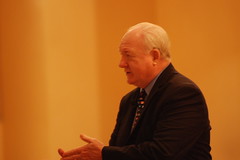(Note: apologies for the slight shakiness of the video. Lesson-learned: Use a tripod.)
Lukaszewski's workshop focused on three man areas:
- Crisis-proofing your organization
- Building Community Relationships
- Being a Strategic Advisor
 Image by hyku via FlickrThis was the second time for me to hear Lukaszewski and he didn't disappoint. Here's the PR gold that was mined from his presentations:
Image by hyku via FlickrThis was the second time for me to hear Lukaszewski and he didn't disappoint. Here's the PR gold that was mined from his presentations:- We need to change the language we use; Readiness vs. Crisis Management
- Readiness means being ready for adverse things.
- Old-fashioned definition of PR - Do good; take credit
- New definition of PR - Do good and let it speak for itself
- Strategic Communicators need to ask/answer, "What do we contribute to the mix?"
- Candor in a crisis - "If you want to be trusted, get the truth out there."
- Truth = Absence of fear
- In a crisis, communications becomes an operating function
- Crises happen explosively but are resolved incrementally
On Victims and Critics during a PR crisis (and other challenging times):
- Victimization is a totally irrational and voluntary state; it is self-maintaining and self-terminating
- Victims use language like betrayed, loneliness, personal/personnel failure, grief, why me/us, why now, etc.
- Victims require validation, visibility, vindication, and apology (This is part of why our media friends like to talk to the victims)
- The strategy for negotiations need to start with what is possible instead of what organization is not going to do.
- "Create as few critics everyday."
- Keep your base supporters and avoid making new angry people.
- Silence is a toxic strategy
- You must manage the victims dimension
- Don't forget the obvious - Stop the activity that is creating more victims
- The art of crisis management is to know what the mistakes are going to be
- "When there's a crisis that needs management, management is in crisis."
- Take in big picture without taking it personal; go to 50,000 feet and stay at 50,000 feet
This is just some of the great material Lukaszewski shared along with some fantastic information on strategically advising leadership during a crisis. He gave valuable tactics on providing operational advice and how to provide the next useful thing to management.
As a communications professional, if you ever have the opportunity to hear from Lukaszewski at a conference or other speaking engagement, I would highly recommend carving out some time and sharpen your skills.



